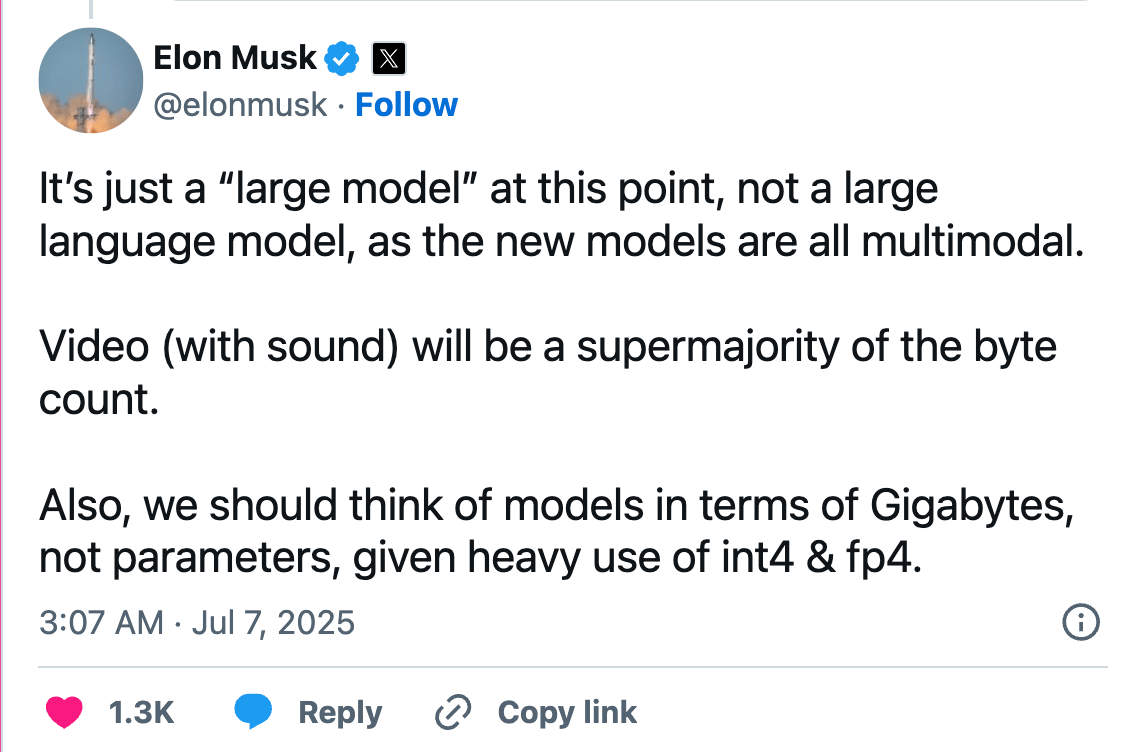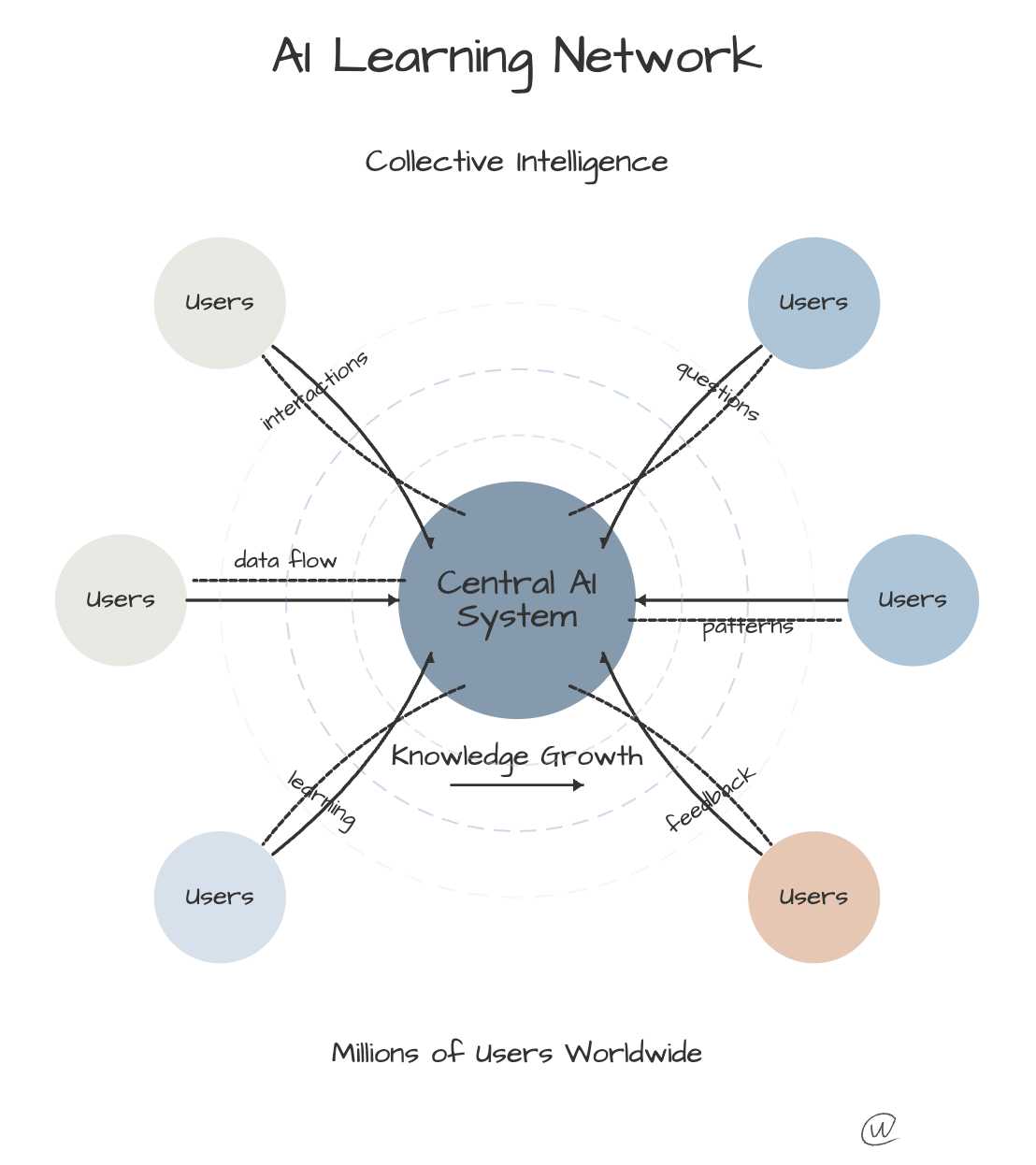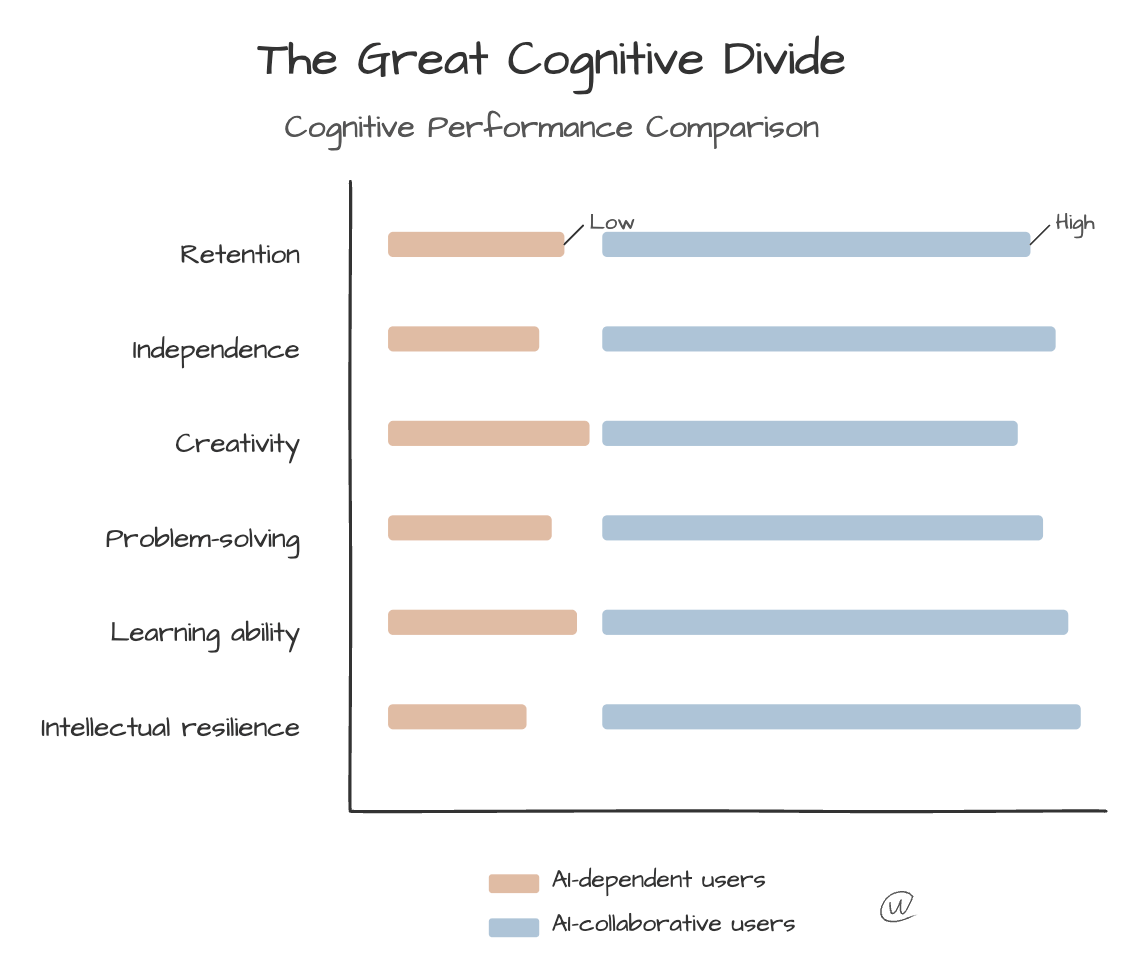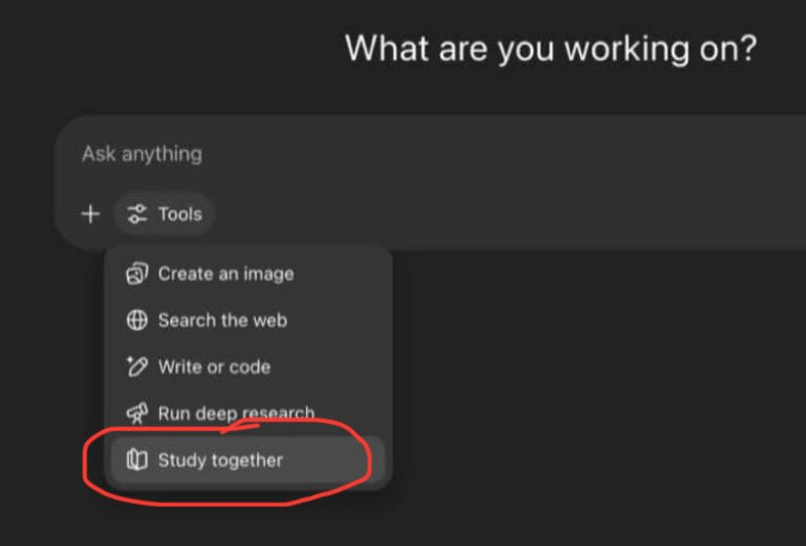- Be Datable
- Posts
- AI's Collective Mind Already Surpasses Us
AI's Collective Mind Already Surpasses Us
Why the Network Effect of AI Usage Creates Unstoppable Momentum
The debate about artificial intelligence and whether it constitutes "real thinking" has reached a fever pitch. After a few days’ break from writing, this topic seemed most relevant.
On one side, researchers argue that AI is merely sophisticated pattern matching. On the other hand, AI enthusiasts and some findings in Neuroscience point to striking similarities between neural networks and human cognition.
Apple recently published research suggesting AI creates only The Illusion of Thinking, arguing that AI really isn’t thinking at all. Many (including me) find this rather funny, especially as this critique comes from a company that has yet to develop a visible AI strategy of its own.
The truth likely sits somewhere between these extremes. But, to me, focusing on this philosophical question misses a more pressing reality.

The Multimodal Future is the Right Question
Current AI systems are quickly growing beyond text. They're gaining vision, hearing, and processing capabilities we don't possess. Thermal imaging, telescopic sight, superhuman strength and speed integrated into robotic systems will significantly alter how we interact with artificial intelligence.
These improved modalities will make AI embodiments appear extraordinarily intelligent, regardless of the underlying mechanics. Even skeptics will need to adapt to this new reality. At some point in the near future, opinions on “thinking” won’t matter.
Recent neuroscience research complicates our understanding of human versus artificial cognition. Studies show our brains frequently make decisions before conscious awareness kicks in. We then construct rational explanations after the fact.
The more I study neuroscience, the less I’m convinced that the human brain is meaningfully different than an LLM.
Recent studies show that our brain often decides to take an action before we’re even conscious of the decision.
And then we come up with rationale afterwards to
— Justine Moore (@venturetwins)
5:20 PM • Jul 6, 2025
This finding suggests human thinking might be more similar to AI processing than we're comfortable admitting. The line between authentic reasoning and sophisticated pattern matching becomes increasingly blurred.
Add to that the modalities like vision, hearing, touch, and we start to really see why one group (including Elon Musk) is confident that intelligence is present.


Most people interact with AI as individual users. You open ChatGPT, Claude, or Gemini for a personal conversation. This feels like a private exchange between you and a single AI system.
But this perception is wrong.
Every conversation, unless conducted on private servers with strict privacy controls, feeds back into a collective intelligence. Each interaction teaches the system something new. Every question asked and answer provided expands the knowledge base.
No human can match this scale of learning. While you sleep, millions of people worldwide continue conversations with these systems.

Knowledge Growth from The Human Network
The AI grows smarter with each exchange, building knowledge at a remarkable speed.
This creates a massive advantage for platforms with large user bases. Companies like OpenAI, Anthropic, and Google aren't just building better AI. They're building larger collective minds that learn from billions of interactions daily.

The Cognitive Partnership Question
I think another (and more important) question isn't whether AI thinks like humans. It's how AI changes human thinking.
Research from MIT shows students who rely heavily on AI for essay writing remember less content and feel less connected to their work. They can't even quote sections days later. Researchers call this "cognitive debt." There are lots of issues with this study and its design, but you can’t argue with the repeating pattern we observed in lazy spelling once spellcheck became ubiquitous.
But generative AI is different. It doesn’t just store or copy, it *simulates* reasoning. For routine writing and bland synthesis, it’s already better than the median person, and it will keep improving.
This phenomenon creates what Sinead Bovell called "The Great Cognitive Divide” where she outlines the difference isn’t using or not using AI. Society will split between those who outsource all thinking to AI and those who use AI to sharpen their own reasoning abilities.

This same thing happens with Every Technological Advance.
The first group will become intellectually dependent. The second will use AI as a sparring partner, testing ideas and exploring new areas. They'll ask: How does this concept break? What's missing? They'll run experiments that AI alone cannot conduct.
The best way to make sure that AI doesn’t make you intellectually lazy is to not use it in a lazy way
So when I work, I need to be mindful about how & when I consult with AI. I never use it for writing drafts or posts, for example. I described some of this to The New York Times
— Ethan Mollick (@emollick)
4:09 PM • Jun 30, 2025
This divide becomes economic, then political. A generation that forgets how to think independently represents a national security crisis.

The Smartest (Hive) Being on Earth
So, how does this collective learning feed back into the debate? Enter the Hive Mind of AI.
Sam Altman, OpenAI's CEO, made an observation at a conference that grabbed a few headlines. He suggested ChatGPT is already the smartest being on the planet. That really stuck with me, and ties directly into this whole argument.
This isn't hyperbole when you consider the collective intelligence factor. These systems have access to more information than any human could process in multiple lifetimes. They're learning from millions of interactions simultaneously.
The question isn't whether individual AI responses match human creativity or insight. It's whether the collective system's knowledge and processing capability exceeds human capacity.
By most measures, it already does.
Companies are recognizing this shift. New products like Perplexity's Comet browser position AI as a "thought partner" for every aspect of digital life. But this also means that every browser session becomes part of the learning. Technically, Google has been doing that for years, but for the purpose of ad audience targeting, not scaling AI learning.
We're excited to finally release our next big product after launching Perplexity in 2022: Comet. Comet is a browser that's designed to be a thought partner and assistant for every aspect of your digital life: work and personal.
— Aravind Srinivas (@AravSrinivas)
3:26 PM • Jul 9, 2025
ChatGPT's "Study Together" has been spotted, although it isn’t available widely yet. This new mode acts as a tutor rather than providing direct answers, or that’s at least what the initial reports state.

Just imagine how crazy this will be for Students.
These developments suggest AI is moving from tool to collaborator. The systems are becoming thinking partners rather than simple answer machines.
This transition requires new strategies for human-AI interaction. We need to design work and learning environments that keep human minds engaged while using AI's capabilities.
The goal isn't to compete with AI's raw processing speed. It's to maintain cognitive resilience while benefiting from AI's vast knowledge base.
Living with AI
Technology's impact depends mainly on how we choose to use it.
Every previous technology wave brought both benefits and drawbacks. AI follows this pattern, but it is also different than anything before the plow, printing press, air conditioning, or the internet.
The difference is AI's ability to learn independently while processing more information than humans ever could. This creates a unique challenge: maintaining human agency while adapting to artificial intelligence that genuinely surpasses human capabilities in many domains.
Whether we call it "real thinking" or "sophisticated pattern matching" becomes less relevant than learning to work alongside these systems effectively.
Probably a good time to go back and watch some “hive mind” movies - Enjoy!
:max_bytes(150000):strip_icc()/GettyImages-2218344211-86cd046e842a44d0a4e33bd185d837b3.jpg)
Reply